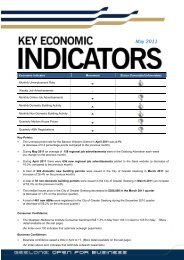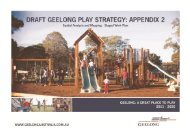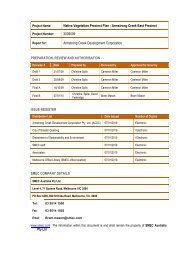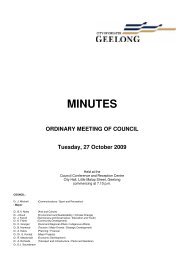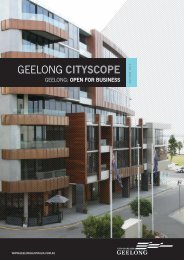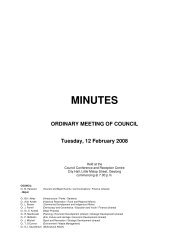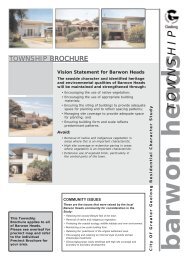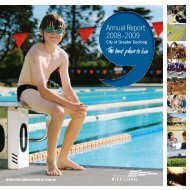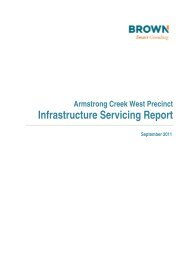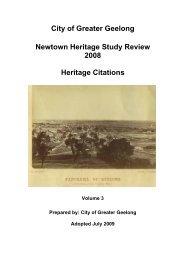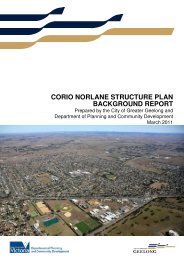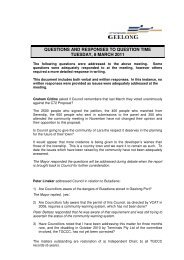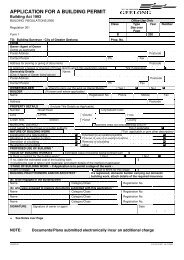CGW Masterplan Review Final Sept11.indd - City of Greater Geelong
CGW Masterplan Review Final Sept11.indd - City of Greater Geelong
CGW Masterplan Review Final Sept11.indd - City of Greater Geelong
Create successful ePaper yourself
Turn your PDF publications into a flip-book with our unique Google optimized e-Paper software.
context<br />
The <strong>City</strong> <strong>of</strong> <strong>Greater</strong> <strong>Geelong</strong> encompasses rural, coastal and urban communities. Council’s ambition is to promote prosperous and cohesive communities throughout the municipality that <strong>of</strong>fer a range <strong>of</strong> exceptional environments. Council<br />
plans to further develop <strong>Geelong</strong> as an international waterfront city that boasts fi rst class facilities and caters for a wide range <strong>of</strong> events and activities. By strengthening the city’s unique urban identity, promoting sustainable growth and<br />
through further improvements to the public environment, Council aims to position <strong>Geelong</strong> and its waterfront as a highly desirable destination.<br />
The Corio Bay waterfront lies at the heart <strong>of</strong> the city. From 1996 to 2000, the <strong>City</strong> in conjunction with the State Government spent over $30million on public realm improvements, positioning Waterfront <strong>Geelong</strong> as a premier waterfront<br />
location. This environment needs to be maintained by delivering a consistently higher level <strong>of</strong> cleanliness and maintenance than is generally found in other parts <strong>of</strong> the city to support and build upon the high level <strong>of</strong> programmed and<br />
unprogrammed activities already achieved in the precinct. Continuous improvement is essential to retain the popularity <strong>of</strong> Waterfront <strong>Geelong</strong>.<br />
un-habitat - united nations human settlements programme - 10 principles for sustainable urban waterfront development<br />
The United Nations Human Settlements Programme, UN-HABITAT, is mandated by the UN General Assembly to promote socially and environmentally sustainable towns and cities with the goal <strong>of</strong> providing adequate shelter for all.<br />
The following 10 principles <strong>of</strong> Sustainable Urban Waterfront Development were approved by the United Nations Urban 21 project and were drawn up at a series <strong>of</strong> international seminars promoted by Wasserstadt GmbH, Berlin with the co-operation <strong>of</strong> the<br />
International Centre Cities on Water, Venice.<br />
Principle 1 - Secure the quality <strong>of</strong> water and the environment. The quality <strong>of</strong> water in the system <strong>of</strong> streams, rivers, canals, lakes, bays and the sea is a prerequisite for all waterfront developments.<br />
Principle 2 - Waterfronts are part <strong>of</strong> the existing urban fabric. New waterfronts should be concieved as an integral part <strong>of</strong> the existing city and contribute to its vitality. Water is a part <strong>of</strong> the urban landscape and should be utilised for specific functions such<br />
as waterborne transport, entertainment and culture.<br />
Principle 3 - The historic identity gives character. Collective heritage <strong>of</strong> water and city, <strong>of</strong> events, landmarks and nature should be utilised to give the waterfront redevelopment character and meaning. The preservation <strong>of</strong> the industrial past is an integral<br />
element <strong>of</strong> sustainable redevelopment.<br />
Principle 4 - Mixed use is a priority. Waterfronts should celebrate the water by <strong>of</strong>fering a diversity <strong>of</strong> cultural, commerical and residential uses. Those that require access to water should have priority. Housing neighbourhoods should be mixed both<br />
functionally and socially.<br />
Principle 5 - Public access is a prerequisite. Waterfronts should be both physically and visually accessible for<br />
locals and tourists <strong>of</strong> all ages and income. Public spaces should be <strong>of</strong> high quality construction and robust<br />
materials to allow for intensive use.<br />
Principle 6 - Planning in public-private partnerships speeds the process. New waterfront developments<br />
should be planned in public-private partnerships. Public authorities must ensure the quality <strong>of</strong> the design,<br />
supply infrastructure and generate social equilibrium. Private developers should be involved early on<br />
to ensure knowledge <strong>of</strong> the market and facilitate development. The coordinators <strong>of</strong> complex waterfront<br />
developments must guarantee their long term economic, social and ecological success.<br />
Principle 7 - Public participation is an element <strong>of</strong> sustainability<br />
Cities should benefit from sustainable waterfront development not only in ecological and economical terms<br />
but also socially. The community should be informed and involved in discussions continuously from the start.<br />
Principle 8 - Waterfronts are long term projects<br />
Waterfronts need to be redeveloped step by step so the entire city can benefit from their potentials.<br />
They are a challenge for more than one generation and need a variety <strong>of</strong> characters both in<br />
architecture, public space and art. Public administration must give impulses on a political level to ensure that<br />
the objectives are realised independantly <strong>of</strong> economic cycles or short-term interests.<br />
Principle 9 - Re-vitalisation is an ongoing process<br />
All masterplaning must be based on the detailled analysis <strong>of</strong> the principle functions and meanings the<br />
waterfront concerned. Plans should be flexible, adapt to change and incorporate all relevant disciplines. To<br />
encourage a system <strong>of</strong> sustainable growth, the management and operation <strong>of</strong> waterfronts during the day and<br />
at night must have equal priority to building them.<br />
Principle 10 - Waterfronts pr<strong>of</strong>it from international networking<br />
The redevelopment <strong>of</strong> waterfronts is a highly complex task that involves pr<strong>of</strong>essionals <strong>of</strong> many<br />
disciplines. The exchange <strong>of</strong> knowledge in an international network between contacts involved in<br />
waterfronts on different levels <strong>of</strong>fers both individual support and information about the most important<br />
projects completed or underway. Further information at www.waterfront-net.org.<br />
CENTRAL GEELONG WATERFRONT MASTERPLAN 2011<br />
5<br />
Urban Initiatives




